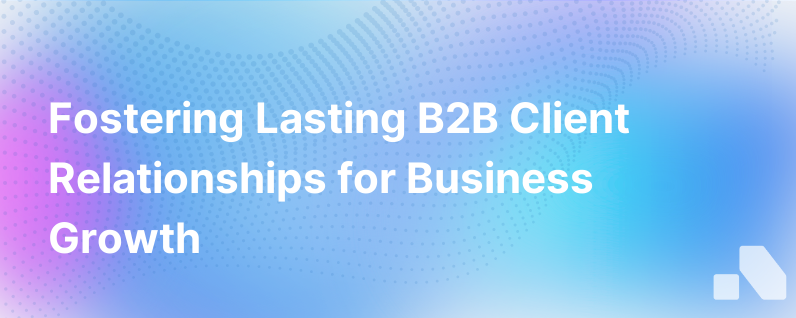Building Long term Client Relationships in B2B Markets
Published on December 5, 2023 by David Zhang
In the B2B landscape, the prolonged client lifecycle and typically higher transaction values underscore the significance of nurturing durable customer relationships. Achieving this is not merely about closing a single deal but rather cultivating a mutual-trust partnership that delivers value well into the future. This piece will explore how B2B organizations can build and maintain these precious long-term bonds.
Understanding the Bedrock of Reliability and Value
To commence, the unwavering reliability of your products or services sets the fundamental tone for the relationship. Delivering what’s promised, when it’s promised, every single time, creates a perception of reliability that can’t be easily dislodged. Meanwhile, providing consistent value goes beyond the tangible aspects of the transaction. It encompasses market insights, guidance, and support that enhance the client’s operations, nurturing their growth alongside yours.
The Gravity of Transparent Communication
Transparent and timely communication constructs a bridge that sustains the relationship through its various phases. Whether it’s about setting realistic expectations, reporting on progress, or promptly addressing issues, the objective here is twofold: keeping the client in the loop and demonstrating your commitment to their success.
Tailored Engagement
Tailoring this engagement approach means not just any interaction but one that is considered and pertinent to their business needs. This requires a deep dive into the client's industry, business model, and strategic goals. By aligning your offering with their long-term vision, you transform the dynamic from vendor to strategic partner.
Empathetic Engagement: Beyond the Business Layer
The importance of empathy in engagements can't be overstated. Actively listening and responding to your clients' concerns builds rapport that is both comforting and reassuring. This involves more than understanding their requirements—it's about appreciating their pressures, constraints, and aspirations.
Strategic Business Reviews
Carving out time for regular strategic business reviews can propel the relationship to greater maturity. These sessions serve as proactive check-ins to reassess needs, celebrate milestones, and pivot strategies if necessary, always with the aim of inching closer to achieving the client’s business objectives.
After-sales: The Potent Afterglow
Post-purchase support and the quality of your after-sales interactions often determine the longevity of a client relationship. Offering comprehensive support can reassure clients of your commitment, indicating that their satisfaction remains paramount beyond the initial sale.
From Feedback to Action: The Cycle of Improvement
Creating channels for your B2B clients to voice their feedback, and importantly, acting on that feedback, is a strong testament to your dedication. This could take the form of customer advisory boards or regular satisfaction surveys. The key is to transform this feedback into actionable improvements, thereby fostering a dynamic, evolving partnership.
Leveraging Technology for Relationship Management
In today's digital age, CRM systems and data analytics tools play a pivotal role in maintaining client relationships. These systems can help you anticipate needs, track engagement, and personalize communication, ensuring that every interaction is relevant and adds value.
Employee Advocacy: Your Frontline Ambassadors
Equally crucial in building lasting relationships is the role of your employees. Those who interact with clients need to believe in your brand’s mission and values. Their advocacy reflects the authentic face of your organization, infusing the client relationship with integrity and sincerity.
Longevity and Loyalty Programs
Rewarding long-term clients can cultivate loyalty and demonstrate that you do not take their business for granted. Loyalty programs that offer preferential terms or services can reinforce their decision to remain with your organization.
Collaboration and Co-creation
Engaging clients in the co-creation of solutions opens another dimension of partnership. It involves them directly in the development process, creating bespoke solutions that satisfy their precise requirements and instill a sense of ownership and alignment with your products and services.
Conclusion
Building and sustaining long-term relationships in B2B markets necessitates a multifaceted and meticulous approach. It’s about demonstrating unshakeable reliability, providing ongoing value, maintaining open lines of empathetic communication, and responding constructively to feedback. Harnessing technology to fine-tune your interaction and leveraging employee advocacy can give you an edge in these endeavors, while loyalty and collaboration further entrench these bonds.
As relationships evolve, remember that businesses seek partners who are just as invested in their success as their own. For B2B companies looking to thrive, the steady cultivation of these relationships is not just beneficial; it's imperative. While it's true that building such partnerships takes considerable effort, tools like those offered by Aomni can streamline this process, leading to a more robust and mutually prosperous business future.
Sources:
- What are the best strategies for building B2B client relationships?
- Building Relationships in B2B Sales: The Key to Long-Term Success
- Learn how to build trust, loyalty, and value with your B2B clients by following these six strategies for maintaining a B2B relationship over time.
- Long-Term Success in B2B Sales: Strong Customer Relationships
- How Important is Trust in B2B Business? - NTC Texas
- The importance of trust in B2B marketing
- The Role of CRM in B2B Customer Relationship Management
- Building Long-Term B2B Relationships: A Step-By-Step Guide